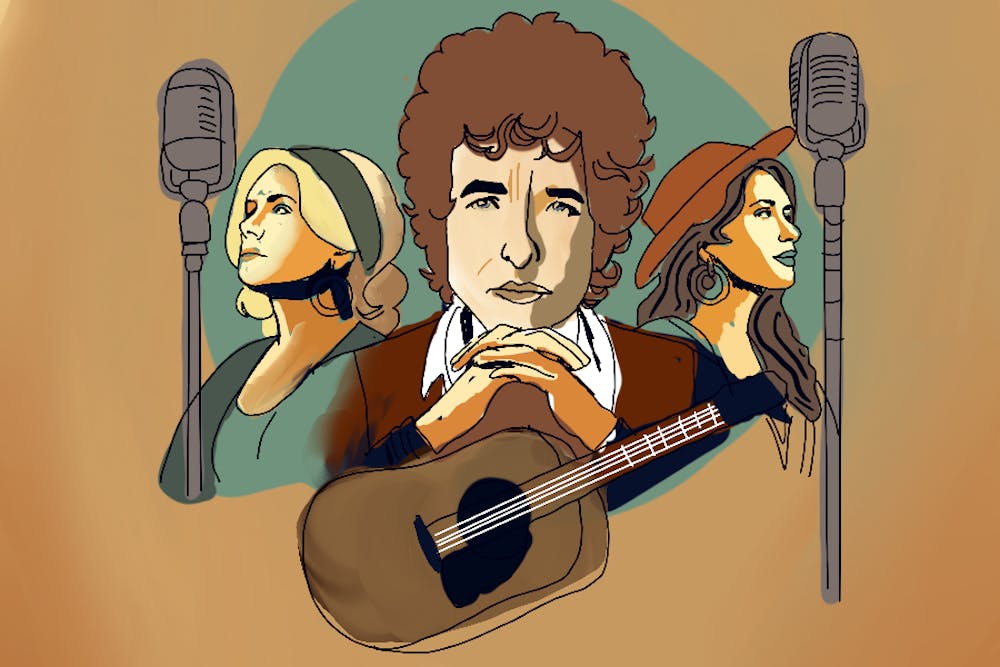Folk originates from the German word "volk," which means "the people." And that's what folk is at its core: from the people, documented and shared with individual experience in mind.
With this background, folk has become an expressive, democratic and often political genre. Think "We Shall Overcome," a gospel song that was an anthem of the civil rights movement, or "This Land is Your Land" by Woody Guthrie, a reaction to the more commonly known "God Bless America." As folk has a resurgence, and the film "A Complete Unknown" boosts its popularity, there's plenty more in the genre to discover and stream than just Bob Dylan.
READ MORE: From 'Masters of War' to 'American Idiot': How music and activism stand the test of time
Traditional
The late 19th century sparked a movement to preserve musical traditions, which was eventually solidified as the folk genre in the following century.
Elizabeth Cotten helped to define folk music over a century ago. Her album Freight Train and Other North Carolina Folk Songs and Tunes was written in the early 1900s when Cotten was a teenager, but wasn't famous until the late 1950s. Her styles are reflective of late 19th, early 20th century Black instrumental music traditions, and were played in her own unique style: upside down, with her left hand, playing bass notes in alternation with single string melodics, according to musicbywomen.org.
Lead Belly is another important figure in the early stages of folk. You might recognize one of his trademark songs "Where Did You Sleep Last Night." The song dates back to the 1800s, but was sung by Lead Belly in 1944 and covered by Nirvana fifty years later.
American Folk Revival
Folk had a revival in America in the 1950s thanks to the resurgence of square dancing in New York City. It became even more popular in the 1960s as young people began to embrace a new folk tradition: protesting the injustices of their society through song. Festivals like the annual Newport Folk Festival also helped bring young people together to enjoy it — which is where artists like Dylan and Joan Baez skyrocketed to fame.
Albums from Joni Mitchell like Ladies of the Canyon and Blue helped to define the post-hippie landscape of the early 70s and pave the way for the growing folk scene on the West Coast (think Crosby, Stills & Nash).
Folk Rock
A little different from the experimental nature of indie folk, folk rock is a hybrid of traditional folk music and contemporary instrumentals.
Artists like Nick Drake helped to incorporate rock into folk in the 70s. His music is rock by definition, but has a chill and atmospheric sound. His album Bryter Layter encapsulates his impact on the folk world, complete with jazz influences and delicate piano arrangements.
Folk Punk
In the 1980s the punk genre rose in popularity, sharing similar lyricism to folk. When the two blended together, folk punk was born. The genre was based on DIY culture and characterized by political lyrics and acoustic instrumentals.
Folk punk was made popular by British bands like The Pogues, a group who drew inspiration from Irish folk. Other bands like Violent Femmes put an American spin on the genre.
Americana
Americana rose to popularity in the 90s as a genre that blended bluegrass' intimate feel with a touch of the blues, a bit of country and the soul of indie rock.
One of Wilco's earliest albums, Being There, is a perfect representation of boundary-pushing Americana. Their work is a result of the direction folk went in an era where heavy rock reigned.
Indie Folk
Beck's fourth album, One Foot in the Grave, is a rickety folk-blues album that honors influences like Skip James in "He's a Mighty Good Leader" and "Fourteen Rivers Fourteen Floods," or Fred McDowells Black spiritual song "You Gotta Move."
Folktronica
Folktronica is an entirely different subgenre of folk that originated in Eastern Europe in the 1980s and mixes elements of hip-hop and electronica with more traditional singer-songwriter folk.
A pioneer of modern folktronica is Mid-Air Thief, a pseudonymous South Korean artist whose magical 2018 album, Crumbling, combines delicate guitar melodies with elements of glitchy dream pop, a Cocteau Twins-esque experience that is emotionally rich regardless of whether or not you understand Korean.
Singer-Songwriter
The 1970s singer songwriter niche is one of the most iconic sounds in the folk world, and continues to influence songwriters in the modern age.
Bedouine's album, Waysides, favors Baez's work, but with a fresh feel. The Syrian-born, Los Angeles-based songwriter draws on vintage folk and country to create her music.
Kara Jackson is another modern folk artist to keep on your radar. A National Youth Poet Laureate, her words are polished with elegance in her album, Why Does the Earth Give Us People to Love? Jackson is yet another example of a folk artist who honors the spirit of folk, but has the future of music in mind.
Edited by Andrew Dirst, Sophia Braccio and Alexis Heichman.
Reach the reporter at ebmosier@asu.edu and follow @eleribmosier on X.
Like The State Press on Facebook and follow @statepress on X.
Eleri is a senior studying interdisciplinary studies, english and sociology. This is her third semester with The State Press. She has also worked in retail.




